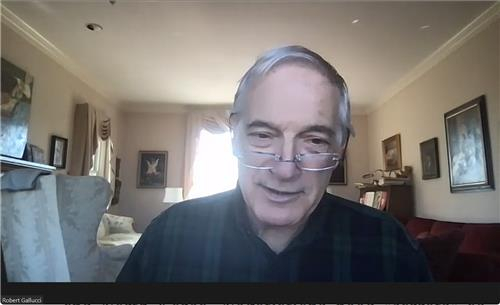U.S. pursuing denuclearization of North needs to make first concession: U.S. experts
![Robert Gallucci, a former U.S. nuclear negotiator, speaks during a webinar hosted by the Stimson Center, a nonprofit think tank based in Washington, on Tuesday. [SCREEN CAPTURE]](https://koreajoongangdaily.joins.com/data/photo/2023/02/22/b35c6ddb-c375-4990-ad1e-9ed2ee3d94ee.jpg)
Robert Gallucci, a former U.S. nuclear negotiator, speaks during a webinar hosted by the Stimson Center, a nonprofit think tank based in Washington, on Tuesday. [SCREEN CAPTURE]
The United States is right in pursuing a complete denuclearization of the Korean Peninsula but needs to consider changing methods to achieve its objective, U.S. experts said Tuesday.
They argued the United States could, or should, consider removing sanctions on the impoverished North to induce dialogue.
“Let me start with U.S. policy objective. I’ve given that an A minus,” Robert Gallucci said in a webinar, titled “A Mid-Term Report Card for Biden’s North Korea Policy.”
Gallucci, a former U.S. negotiator in denuclearization talks with North Korea, said there existed an ongoing debate in Washington over whether it would be wise for the United States to give up its objective of completely denuclearizing the Korean Peninsula.
“I think the debate is appropriate and I am glad it’s happening, but I think the correct answer is the one the administration came to,” he told the webinar hosted by the Stimson Center, a nonprofit think tank based in Washington.
“Complete denuclearization is still the right goal,” he added.
U.S. policy or tactics for achieving its objective, however, has not worked, insisted Gallucci, currently a professor at Georgetown University’s School of Foreign Service.
“If the strategy is pressure plus sanctions […] one of the things that comes out of this is that it doesn’t work and it hasn’t worked. That if the idea of pressure and sanctions together is to drive the North Koreans into negotiations and ultimately a bargain with the United States, it just hasn’t been working,” he said.
North Korea has stayed away from any denuclearization talks since 2019.
The Joe Biden administration has consistently offered to sit with the North Koreans since coming into office in early 2021, but Pyongyang has shown little, if any, interest in engaging with the U.S.
Robert Carlin, a research fellow at 38 North, argued the United States needs to do more to restart dialogue with the North than repeating that it has no hostile intent toward Pyongyang.
“There was a period in the first three months of 2022 when the Russians and the Chinese made a concerted effort, I think, to signal to the Americans that what was necessary was not this repetition of jingles, and jingles is the Chinese term they used to describe what we were doing, but we needed to take practical steps,” said Carlin.
“Interestingly, the North Koreans picked that up and began to replay that, which to me meant they were saying, ‘Yes, let’s see some meat on the table first,'” he added.
Carlin is said to have visited North Korea more than 30 times as a policy adviser at the now-defunct Korean Peninsula Energy Development Organization, a project that was designed to build light water reactors in the energy-stricken North Korea in exchange for Pyongyang giving up its nuclear ambition.
![Susan Thornton, former U.S. acting assistant secretary of state for East Asia and Pacific affairs, speaks during a webinar hosted by the Washington-based Stimson Center think tank on Tuesday. [SCREEN CAPTURE]](https://koreajoongangdaily.joins.com/data/photo/2023/02/22/b4df6abd-16e5-4df1-bd1d-1ab3fed69735.jpg)
Susan Thornton, former U.S. acting assistant secretary of state for East Asia and Pacific affairs, speaks during a webinar hosted by the Washington-based Stimson Center think tank on Tuesday. [SCREEN CAPTURE]
Gallucci agreed that the U.S. needs to make the first move.
“They [North Koreans] think we are the stronger part of the two when they are speaking honestly, and they don’t understand why we don’t do what the stronger party is supposed to do, which is make the first concession,” said Gallucci.
To this end, Gallucci said the United States may consider two things — easing sanctions on North Korea and reducing joint military exercises with South Korea.
“There’s a reason to have sanctions in place other than to motivate the North, and it’s a demonstration of that serious concern about activity which we regard as illegitimate, even if we don’t think the sanctions are going to have that kind of enormous impact, and it’s going to change policy in the North,” he said.
“So we can dial back some sanctions, I think, without catastrophic consequences and that would be substantive,” he added.
Susan Thornton, former U.S. acting assistant secretary of state for East Asia and Pacific affairs, noted lifting sanctions might be worth a try.
“I am very pessimistic, but I am all for changing up the equation,” she told the webinar.
“It has certainly been, I think, more than proven that the sanctions are not going to make any difference, especially since the North Koreans sealed off their own border and shut themselves off from the world,” added Thornton. “So, trying to lift the sanction just to shock the world and show that sanctions can be lifted at some points would maybe, you know, be something to try.”
Yonhap




















